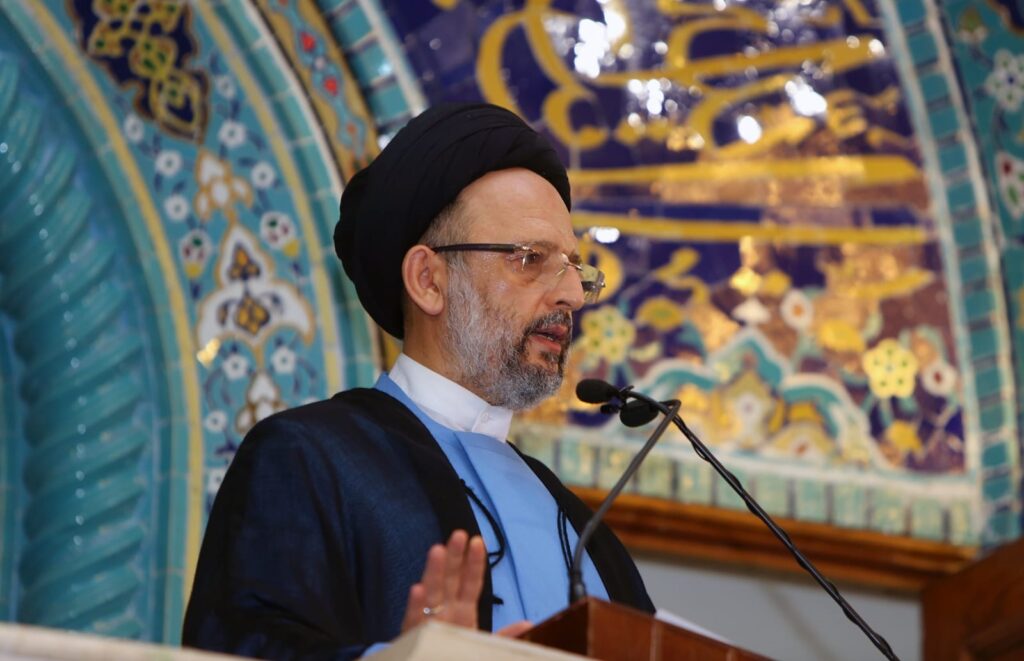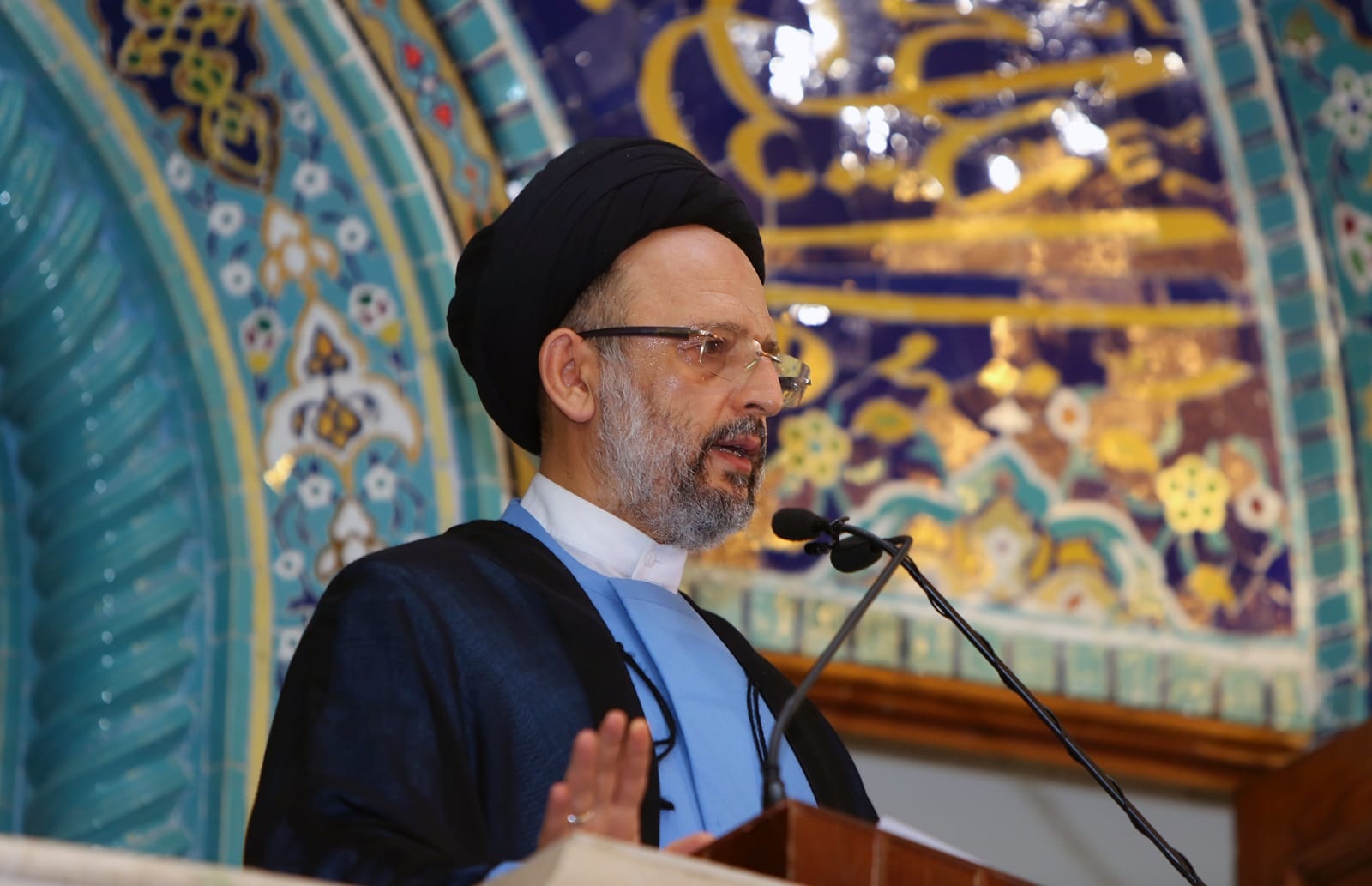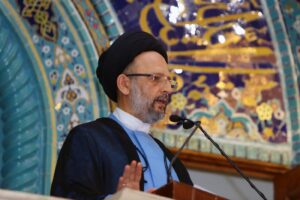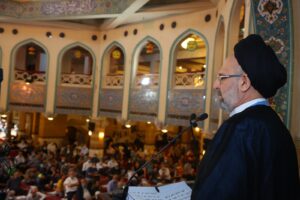In The Name of Allah, The Compassionate, The Merciful.
His Eminence, Sayyed Ali Fadlullah, delivered the two Friday prayer sermons at the Imamain Al-Hassanain Mosque, JamadaI 11, 1445 /November 24, 2023. Several prominent religious scholars, dignitaries, and hundreds of believers attended the Jumu’a prayer. Following is a summary of the sermons.
The first sermon
Allah, The Most Exalted, says in His Glorious Book: ‘Allah only desires to remove impurity from you, O people of the household, and purify you with a thorough purification.’
We observe on the thirteenth of Jumada I, the anniversary of the passing of the pure lady, Fatimah Al-Zahra, the daughter of the Messenger of Allah and the leader of the women of the worlds. This is based on the accepted narration stating that her passing occurred seventy-five days after the passing of the Messenger of Allah (p.).
Her departure left sorrow and grief in the hearts of her loved ones from among the people of her household, and those who know her status with God, fulfilling His will by being among those who were purified thoroughly. She also was an immense blessing bestowed upon His Messenger when He said: ‘Verily, We have granted you, [O Muhammad], Al-Kawthar.’ And from this enormous goodness was Al-Zahra, who reached such a high status with the Messenger of Allah when he said about her: ‘Fatimah is a part of me; whoever makes her angry has makes me angry, and whoever pleases her pleases me.’ Fatimah is my heart and soul that lies between my sides.’
This had a significant impact during her life, one from which we still draw and will continue to do so until Allah inherits the earth and whoever is upon it.
Lady Fatimah (a.s.) was an exemplar and a role model for both men and women. We are in dire need of her to make our lives purer, more refined, and elevated, to have a distinctive and impactful presence in all domains.
In the field of worship, her worship mirrored that of the Messenger of Allah. She worshipped Allah to the extent that her feet would swell due to the long durations of her prayers. Her son, Imam Al-Hassan (a.s.), narrated: ‘I saw my mother Fatimah standing in her prayer niche on the night of her death, and she did not cease bowing and prostrating until the morning light became apparent.’
She constantly supplicated to God, seeking His assistance: ‘O Allah, make me devoted to what You have created me for … Inspire me to obey You, to act in a way that pleases You, and to avoid that which displeases You, O Most Merciful of the merciful.’
She strived to be in the arenas of struggle alongside the Messenger of Allah, to tend to the wounded, provide water, support the needs of the fighters, and stand by their side.
She held a significant position in the realm of knowledge. She became a source to go back to for all men and women seeking knowledge, which she inherited from the teachings of the Messenger of Allah, the Most Exalted.
In her character and generous heart, she embodied the character of the Messenger of Allah and the compassion for which he was known.
Fatimah was a role model in selflessness and generosity, being a refuge for the needy and orphans, and fulfilling their needs. She exemplified the verse: ‘And they give food in spite of their love(need) for it to the needy, the orphan, and the captive, [saying], ‘We feed you seeking Allah’s countenance only. We wish for no reward or thanks from you.”
In her childhood, Fatimah represented the highest model of tenderness, care, and concern for her father, especially during the difficult phases of his call against the polytheists to the extent that The Messenger of Allah even described her as her father’s mother.
Then, in her marital life, she set an example in her choice of a life partner. Among all those who proposed to her, she chose Ali (a.s.) , considering his character, faith, and struggles in the path of Allah. Even though Ali (a.s.) had no wealth, status, or influence, unlike the other suitors, when he came seeking Fatimah’s hand, the Prophet(p.) asked him if he had anything to give as a dowry. Ali (a.s.) possessed nothing except his sword and armor, which he sold and presented as a dowry.
Throughout the time she spent as a wife of the Commander of the Faithful, she endured hardships and the challenges of life. Ali (a.s.) was continuously engaged in battles, assuming significant responsibilities assigned by the Messenger of Allah(p.) to him. She never complained but was content, finding consolation in the knowledge imparted to her by the Messenger of Allah, which is known as ‘Tasbih of Fatimah.’
She became a role model for every mother, dedicating herself to raising and caring for her children. Imams Hassan and Hussein the leaders among the youth of paradise, Zaynab the hero in Karbala, and Umm Kulthum were the fruit of her upbringing, evident in their sacrifices for Allah, Islam, and the honor and strength of Muslims.
Imam Hassan conveyed some glimpses of her upbringing and what she instilled in her children when he said: ‘I saw my mother Fatimah on a night in which she was engaged in prayers. She invited me to sit beside her to learn from her example, which she did with all her children. She remained in prostration until the morning light, praying for the believers, naming them and multiplying prayers for them, never asking for anything for herself. I asked her, ‘Mother, why do you pray for others and not for yourself?’ She replied, ‘My son, the neighbors come first, then the household [members].’
She aimed to raise her children to prioritize others before themselves, their interests and comfort before their own.
Events following the death of the Messenger of Allah highlighted Fatimah’s presence in public affairs and her stance on fighting any deviation or wrongdoings she witnessed. When Ali’s rights were denied, she did not demand them because he was her husband, but because she saw him as having the foremost right to manage the affairs of Muslims. Her demand for Ali’s rights wasn’t for her benefit but as a lmplementation of what was indicated in the Quran and for securing justice.
Despite the pain and injustices she faced, she expressed her positions boldly, keen on preserving Muslim unity and preventing discord that those seeking Islam’s downfall intended.
On the occasion of Fatimah’s death anniversary, we should not limit our expression of gratitude by mourning in gatherings or shedding tears. Instead, we are in dire need to embody her in all aspects of her character and her missionary role expressed in her home and society, in her resolute voice against deviance and injustice, and in safeguarding the unity of Islam.
In doing so, we honor her and prove worthy of carrying her name and belonging to her. Peace be upon Fatimah, the day she was born, the day she joined her Lord’s realm, and the day she will be brought back to life.
The second sermon
Worshippers of Allah, The Most Exalted: I advise you and myself with what Al-Zahra (a.s.), the daughter of the Messenger of God, advised when a man came to her saying, ‘O daughter of the Messenger of God, did the Messenger of God leave anything with you that you could advise me with?’ She called on her maid, to bring her, the silk garment.’ When the latter could not find it, Fatimah said, ‘Woe unto you, seek it, for it equals in my eyes Hassan and Hussein.’
When the maid found it and brought it to Lady Fatima, she opened it for the man, and it contained: He is not a believer from whose harm one’s neighbor is not safe, and the one who believes in Allah and the Day of Resurrection does not hurt his neighbor. The one who believes in Allah and the Day of Resurrection, his speech should be gentle or remain silent. Allah loves the one who is benevolent, tolerant and virtuous. Allah hates the one who abuses, is foul-mouthed, shameless …’
We are in dire need of evoking these meanings to correct the image of the believer within us and to build, through them, the believing society we desire. With that, we become more aware, responsible, and capable of facing challenges.
We begin from Gaza, which has witnessed, for over fifty days, the massacres perpetrated by the enemy that targeted civilians in their homes, shelters, hospitals, schools, and places of worship, all aimed at depopulating Gaza by killing its inhabitants, depriving them of their means of living and transferring them.
If there is a ceasefire to provide relief for the people of Gaza to heal their wounds and bury their martyrs, it will only be a brief interval before war returns in all its ferocity and aggression, as the enemy openly declares. If they accept a pause, it won’t be out of humanitarian motives but due to pressure from the families of prisoners after they failed to fulfill promises of their return through military means without exchange, because of the resilience of the Palestinian people and the bravery of their resistance.
It’s also to alleviate the impact of international pressure urging an end to this insane war, and the voices raised in various global arenas, among popular, media, and political circles, condemning these crimes after the exposure of the falsehoods in their narrative about what occurred.”
From here, we see the importance of continuing international and popular pressure to stop this bloodshed and not settling for a pause that won’t be a solution to the suffering of the Palestinian people…
We salute the Palestinian people and their resistance for their resilience and bravery in the field. They have managed to thwart the enemy’s objectives and compel them to negotiate and agree to a “ceasefire”. The enemy used to declare that they would not cease the war without the return of all their prisoners without negotiation. With this determination and willpower, the Palestinians will be capable of thwarting the enemy’s plans and achieving their goals.
In this battle, they were not and will not be alone, as confirmed by the support received from multiple fronts in Yemen, Iraq, Syria, and Lebanon, and the resounding voices that have been heard in international and regional forums. These voices will persist until this people regains its freedom and rights to live…
Unfortunately, discussions about the fate of the Palestinian people take place in international and regional forums away from the will of the people who alone have the right to determine the choices that guarantee their rights. The world must understand that any project that disregards the rights of this people will not be a solution and will not secure what the Zionist entity desires in terms of its security and stability.
We turn to Lebanon, which continues to affirm its solidarity with the Palestinian people through the sacrifices of the Lebanese, providing substantial sacrifices daily to support this people and strengthen their resilience. This support hasn’t been limited to those standing on the frontlines against this enemy; it extends to the media sphere, which the enemy sought to silence to prevent coverage of the resistance’s actions and the enemy’s aggression against peaceful regions.
We commend all these sacrifices and efforts made by those facing these challenges, working to preserve this nation and standing in solidarity with the Palestinian people in their struggle against a common enemy. We offer condolences to the families of the martyrs and pray for the recovery of the wounded. At the same time, we reiterate our call to the Lebanese people to unite in confronting this enemy amid the witnessed attacks and ongoing threats against this homeland. This underscores the necessity of readiness to confront this enemy, reinforce unity and internal resilience, refraining from engaging in any arguments that could weaken this unity and be exploited by the enemy. It’s crucial to earnestly work on filling the existing vacuum within state institutions, whether in the presidency or the leadership of the army, given the importance of the role the army plays in maintaining internal stability and confronting the Zionist enemy.
At this point, we caution against any actions that might harm this institution, which represents the existence of the state and national unity, whether by undermining it or turning it into a subject of political disputes or settling scores.
Simultaneously, we reaffirm the necessity of continuing efforts to address the crises faced by the Lebanese people in their livelihoods and daily lives due to rising prices and insufficient wages that no longer meet their needs.
In this regard, we warn against the state’s policy, which appears to focus on addressing its needs by extracting more taxes from the citizens, a strategy that seems to form the cornerstone of the 2024 budget. Instead, they should rely on other available means to the state to revitalize the economy and utilize state resources, as the Lebanese can no longer bear additional burdens





